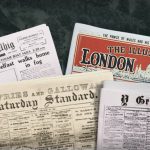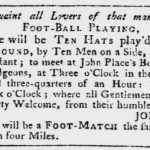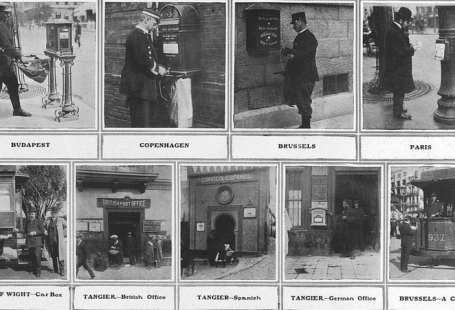This week at The Archive we have added another 339,307 brand new pages to our collection, with 22 brand new titles joining us this week alone, from England, Wales and Scotland. Meanwhile, we have updated 57 of our existing titles, bringing you a feast of new pages for another week in a row.
So read on to discover more about our new titles of the week, which include four Scottish newspapers and regional titles from eight English counties, as well as a special religious title that represented a particularly forceful branch of Victorian Methodism. You can also find out more about all of our updated titles of the week, as well as the opening of the Manchester Central Hall in 1886, which represented an attempt by the Methodist ‘Forward Movement’ to appeal to more of the working classes.
Register now and explore the Archive
And it is with the Methodist Times that we start our exploration of this week’s new titles. Sub-titled ‘A Journal of Religious and Social Movement,’ the Methodist Times was established in 1885 as the mouthpiece of the Methodist ‘Forward Movement.’ The Forward Movement was a particularly forceful evangelical branch of Methodism, which focused on reaching out to the urban poor in the late Victorian era, and its leader was Wesleyan Methodist Hugh Price Hughes (1847-1902).

It was only fitting, therefore, that Price Hughes became the first editor of the weekly Methodist Times, which was published in London and cost one penny a copy. Price Hughes was born in Carmarthen, the son of a surgeon, but he decided to follow in the footsteps of his minister grandfather, becoming a preacher and pastor. Through the Methodist Times, Price Hughes was able to focus on the social issues that were important to him, with a particular focus on temperance, gambling and social morality.
‘Discussing questions of interest to modern Methodists,’ with a circulation both in the United Kingdom and beyond, the Methodist Times aimed to circulate amongst both the ‘educated younger generation’ and the working classes. Filling sixteen pages, and appearing every Thursday, the Methodist Times contained news of churches across Britain and beyond, looking for example at ‘Methodism in London’ and ‘Methodism on the Gold Coast.’ It also contained thought pieces with titles like ‘Are The Working Classes Indifferent To Religion?’ as well as a look beyond the realm of religion, to the latest on literature, art, science and music, with reports on ‘current events.’

By 1900 the newspaper had a circulation of over 150,000, and when Price Hughes died in 1901, Sir Percy Bunting took over as editor. He was then succeeded by J. Scott Lidgett, and the Methodist Times continued as a mouthpiece for liberal and forward-looking Methodism. Indeed, Scott Lidgett said that the journal was founded ‘to give impetus to a modern and aggressive spirit in Christian life and effort.’ Meanwhile, the publication was bought in 1925 by J. Arthur Rank, and then in 1932 it amalgamated with the Methodist Leader, before finally being joined with the Methodist Recorder in 1937.
It’s only fitting now that we turn to Wales, the birthplace of Methodist Times founder Hugh Price Hughes, for our next new title of the week. The Welsh Gazette was a proudly nationalistic title, promoting the interests of Wales above all else. First published in 1899 in Aberystwyth, its inaugural edition declared how:
The policy of this journal will be dictated by the needs and aspirations of the Welsh nation. Strongly Liberal and Progressive in policy, we shall endeavour to keep clear of personal rumour and party prejudices…In Wales, we feel there is a need of a newspaper which look at Welsh questions from a thoroughly impartial point of view, irrespective of politics, and we shall not hesitate to fight for the higher interest of Wales, even should it lead us to do battle against our political friends. We believe in the Gospel of Welsh Nationalism.

The first edition of the Welsh Gazette had thrown down the gauntlet, going on to state how:
Wales can achieve a higher and nobler civilisation by retaining her national life in all its beautiful and varied character then by rooting up her peculiar characteristics and conforming to the dead level of English civilisation.
Appearing every Thursday at the cost of one penny, the Welsh Gazette contained the latest news from Aberystwyth, including from the Aberystwyth County Court, as well as the latest from the likes of Dolgellau, Corris, Aberaeron, Llwyngwril, and many other towns and villages in the west of Wales. Meanwhile, the newspaper also took a look at the Welsh populations in London and Liverpool, whilst containing shipping news, church news and correspondence. The Welsh Gazette also contained some columns in the Welsh language.
It’s to Scotland we go to now for our next four new titles of the week, and we begin our foray into that particular country with the eminently historic Weekly Scotsman. Now this newspaper has its origins with the much respected Scotsman, which was founded in 1817 by lawyer Wiliam Ritchie (1781-1831) as a radical publication, in contrast to the ‘unblushing subservience’ of other contemporary newspapers to the Edinburgh establishment.

The Scotsman was initially published every Saturday, but in 1855 the newspaper switched to a daily publication schedule, following the abolition of newspaper stamp duty. And so the Weekly Scotsman was the weekly version of this national newspaper, ‘circulating universally in Edinburgh, Glasgow, and every town and village in Scotland and the North of England.’ Indeed, by the 1880s the Weekly Scotsman had a ‘considerable circulation in England and Ireland, and largely abroad,’ having the reputation for being one of ‘the most widely-circulated, cheap weekly papers in the kingdom.’
We travel further north into Scotland now, with the addition of the Oban Telegraph and West Highland Chronicle, which was founded in 1876. An ‘Independent Liberal’ publication, the Oban Telegraph circulated in Oban, a resort town between Helensburgh and Fort William, and ‘generally in the West Highlands and Islands,’ with the both the ‘local and district news over a wide area’ being fully reported. Other ‘prominent features’ of the Friday weekly, which cost just one penny, were agricultural items, literary views, news of the markets and a ‘summary of general intelligence.’

We stay on the Scottish west coast for our next new title of the week, which is the Ayrshire Weekly News and Galloway Press. Published in Ardrossan, a town on the north Ayrshire coast, this Conservative newspaper was founded in 1859 and appeared every Saturday at the cost of one penny. Circulating in Ayrshire and the ‘west and south of Scotland generally,’ this newspaper featured local news from the likes of Kilbirnie, Kilmarnock, Ayr, Catrine, Darly, Kilkerran, Stewarton, Largs, Maybole, West Kilbride, Irvine, and Galston. The Ayrshire Weekly News also devoted space to poetry and short stories, as well as reports from ‘The Ice,’ which contained details of curling matches.
Our final Scottish newspaper of the week is the Scottish Border Record, which was published in Galashiels, a town which lies in the Scottish border area. Established in 1881, this Liberal newspaper appeared every Wednesday and circulated in the counties of Roxburghshire, Selkirkshire, Peeblesshire, and Berwickshire. Containing the ‘more important home and foreign news of the week,’ the Scottish Border Record had the reputation of being ‘a good family paper for all classes of borderers.’

We now move across the border and down to Stockport for our next new title of the week, the Stockport Express Advertiser. Historically a part of the county of Cheshire, Stockport is now part of Greater Manchester, and the Stockport Express is the town’s main newspaper. Formed by the merger of the Stockport Express and the Stockport Advertiser in 1981, and appearing every Thursday, in 1999 the newspaper became simply the Stockport Express, and continues to be published to this day.
Staying in Cheshire, we’re delighted to welcome the Macclesfield Express to our collection, which traces its origins to the historic Macclesfield Courier, which was established in the early nineteenth century. Still going strong over two hundred years later, the newspaper describes itself as being ‘for and about people who live and work in the Macclesfield area of Cheshire,’ appearing every Wednesday.

Moving to the adjoining county of Staffordshire, our next new title of the week is the Burton Trader, which was founded in the Staffordshire market town on Burton-on-Trent in 1970 as the Burton, Ashby and South Derbyshire Trader. Initially part of the Trader Group Newspapers, which covered the East and West Midlands with a combined circulation of 800,000 per week, the Burton Trader appeared every Wednesday, with a particular focus on Burton-on-Trent and the surrounding parts of south east Staffordshire and south Derbyshire. This weekly freesheet eventually closed in the summer of 2009.
We remain in the Midlands for our next two titles of the week, the first of which is the Birmingham News. Founded by local entrepreneurs Chris and Pat Bullivant in October 1984, and edited by David Scott, the Birmingham News was Europe’s first ever free daily newspaper. Delivered to 276,00 homes in Birmingham and Solihull, only a few years after it was founded the publication claimed to be ‘the best read newspaper in Birmingham.’
After seeing initial success, when the 1990s recession hit the Birmingham News soon saw a reduction in advertising revenues. And so in 1991 the title became weekly, and it was renamed as the Birmingham Metronews. By the new century, in 2000, the Birmingham News once again became daily, as the Midlands edition of the Metro group of newspapers.

Our second Warwickshire title of the week is the Sutton Coldfield News, a newspaper which served the wards of Sutton Oaks, Sutton Trinity, Sutton Vesey, Sutton New Hall, Erdington and Streetly in the West Midlands. Published in the large town of Sutton Coldfield, the newspaper appeared every Friday at the cost of 17p, before it eventually became free.
We move a little further south for our next new title of the week, which is the Abingdon Free Press, which was founded in 1902 in the historic Oxfordshire market town of Abingdon as part of the Berkshire Chronicle series. Initially titled the Abingdon Free Press and Didcot News, this publication cost one halfpenny and appeared every Friday, with local news from the likes of Abingdon, Marcham, Hurst, Shrivenham, Grove, East Hendred, Kingston Lisle, Denchworth, Ardington, Hanney, Wallingford, Broadmoor, and Wantage.

Meanwhile, the lively local newspaper also featured articles on sport, including ‘Cycling Chit-Chat’ and reports on football matches, with one such focussed on ‘Reading’s Grand Performance at Portsmouth.’ The Abingdon Free Press also contained columns devoted to ‘Society and Fashion,’ with commentary on the latest dresses, as wells as notes on Abingdon’s history, and serialised stories like Fergus Hume’s ‘The Grasp of Guilt; or Murder Will Out.’
From Abingdon to Bedford now, and we’re excited to introduce Bedfordshire On Sunday to our collection. A free local newspaper which comprised of two editions, one for the borough of Bedford and the other for central Bedfordshire, this newspaper had a circulation of 112,000, and was delivered to homes across the county, as well as being given out at local supermarkets, newsagents and other such places.

This pioneering Sunday newspaper was founded in 1977 by Frank Branston (1930-2009), a journalist, novelist and the first directly elected Mayor of Bedford. After forty years, the newspaper’s last edition appeared on 1 October 2017.
We have added a range of titles this week from in and around London, including the Harrow Informer, which appeared every Thursday and was delivered for free to 61,856 homes and businesses. Covering Harrow, Harrow Weald, Hatch End, Kenton, Pinner, Rayners Lane, Wealdstone, Northwood, Northwood Hills, this title was published in Ruislip.
Another Informer title joins us this week, namely the Hounslow & Chiswick Informer, which appeared every Friday and was printed at Kingston-upon-Thames. Delivered weekly to 66,705 homes and businesses, this newspaper covered Heston, Hounslow, Osterley, Brentford, Isleworth, Whitton, Hanwell, South Ealing, in London’s west.

The third of our trio of West London titles this week is the Uxbridge Leader, which formed part of the Middlesex County Press holdings. Another free title, the Uxbridge Leader was published every Thursday, with 84,946 copies being distributed across Northwood Hills, West Drayton, Uxbridge, Hayes, Hillingdon, Ruislip and Eastcote.
It’s off to East London now for our next new titles of the week, and we begin by looking at the Greenwich and Deptford Observer. Established in 1862 as a Liberal newspaper, the Greenwich and Deptford Observer appeared every Friday at the price of one pence, published by George Wardley from South Street, Greenwich. This newspaper circulated ‘in Greenwich, Deptford, New Cross, Brockley, Lewisham, Blackheath, and the towns and district of West Kent.’

And published not too far away, although with a different political allegiance, was the Woolwich Herald. Established in 1891 as a Conservative newspaper, the Woolwich Herald was published by O.W. Hartley from 6 Wellington Street, Woolwich, a district within the Royal Borough of Greenwich, and an important naval, military and industrial area. This newspaper appeared every Friday, boasting twelve pages for just the cost of one penny.
We move away from London now and into Kent for our next two new titles of the week, the first of which is the Chatham Standard. Established in 1855 as the Rochester, Chatham & Gillingham Journal, Chatham Standard & Mid-Kent Advertiser, and originally printed in the town of Rochester, the Chatham Standard appeared every Friday at the price of one penny, circulating in’ Rochester, Chatham, Strood, and vicinity, and the district of Mid-Kent.’

Initially advocating ‘the principles of the Church of England and the Conservative Party, together with agricultural, commercial, and shipping interests,’ by the 1980s the Chatham Standard was appearing every Tuesday at the cost of 26p. Known as a lively and authoritative local newspaper, the Chatham Standard sadly closed in 2011.
Our second new Kent title has a focus on Sevenoaks, the Kent commuter town, and is the Sevenoaks Focus. Initially known as the News in Focus, in 1989 the newspaper became Sevenoaks in Focus, appearing every Thursday.
Our penultimate new title of the week hails from Surrey, and traces its origins back to 1895. This newspaper is the Horley & Gatwick Mirror, a local edition of the Surrey Mirror, which was founded in 1895 as the Horley Advertiser. In 1913 the newspaper was renamed to the Horley Advertiser and County Post, before it was relaunched in 1986 as the Horley Mirror. Sold in the Surrey commuter town of Horley, and in Gatwick across the West Sussex border, this newspaper appeared every Friday.

Our final new title of the week is the South Devon Weekly Express, which was founded in 1855 as the Weekly Express in the ancient Devon wool town of Chudleigh, which lies between Newton Abbot and Exeter, close to the edge of Dartmoor. The ‘oldest district paper in South Devon,’ the South Devon Weekly Express had a ‘first-class circulation,’ appearing every Wednesday, and was independent in its politics.
That’s it from all our new titles of the week, meanwhile we have updated 57 of our existing titles. Highlights include the over 16,000 pages we have added to the Nottingham Evening Post, whilst we have added over 11,000 pages to both the Loughborough Echo and one of last week’s new titles the Trowbridge Chronicle. We have also added new pages to one of our Welsh language titles, Y Tyst.
The Opening of the Manchester Central Hall
In August 1886 the Methodist Times detailed how ‘The Manchester Oldham-street Central Hall was reported to be near completion.’ This was the first of many Central Halls to be built by the Methodist Forward Movement between 1886 and 1934, the movement aiming, via their construction, to provide alternative attractions to the music halls and public houses, with a range of lectures and concerts, and religious services.

Indeed, the Central Halls aimed to be ‘Churches for the People,’ generally being able to hold 1,000 people, with a mix of worship space and lecture rooms. The Manchester Central Hall was to be the flagship of this scheme, which was based on robust and forceful evangelicalism, and it was a source of great excitement amongst the Methodist community at the time of its opening in the autumn of 1886. The Methodist Times reported how:
The building more than fulfils the highest expectations formed respecting it, and no wonder that all classes of Methodists in Manchester and the neighbourhood are proud of it. The liveliest interest has been excited in the plans to be adopted for the use of the premises.
The centrepiece of the Manchester Central Hall was a room ‘in the style of an amphitheatre, capable of seating nearly 1,500 people,’ whilst the building also housed a ‘great variety of rooms suitable for all kinds of aggressive and evangelistic work.’
Meanwhile, the Central Hall would have three distinct types of Sunday services, with the morning service being ‘intended chiefly for the small population resident in the locality, for persons staying at the hotels in the city, and for the band of faithful workers who, in spite of many discouragements in the past, have maintained their connection with Oldham-street.’

The evangelical work of the building and its mission would begin in earnest in the afternoon, the Methodist Times describing how:
On Sunday afternoons the large hall will be opened for a gathering of working people who will be invited from all parts, special efforts being made to reach non-worshippers. It is a lamentable fact that large numbers of the more intelligent and industrious working clases never think of entering a regular place of worship. They are not merely indifferent; they have a rooted dislike of churches and chapels.
The building of the Manchester Central Hall aimed to address this apathy, the Methodist Times reporting how:
It is believed that a commodious and beautiful hall in the very heart of the city, with all seats free, will prove an attractive place of resort, and that addresses on the reasonableness of Christianity, and on its bearing on social topics, will meet a real want, will remove many misapprehensions, and open the way to personal contact between Christian people and a crowd of unbelievers.
And by the time the evening came around, the Central Hall aimed to attract ‘another class’ of punter:
Although few people live in the locality, yet on Sunday evenings Oldham-street is a crowded thoroughfare. Thousands of people pass and repass from one suburb to another, or congregate for purposes of amusement, and as visitors to the numerous public houses in the street. Most of these are young people not attached to any place of worship. Some are dissolute, but the great majority are at the point when the board and narrow ways diverge… A popular and attractive service will be provided for these.

This was where the Central Hall as an alternative for less salubrious entertainment would really come into its own.
And the first midday service held at the Manchester Central Hall was a great success, as the Methodist Times reported on 18 November 1886. ‘About six hundred persons were present,’ and there was ‘goodly number of inquirers in the evening,’ just as those behind the Hall’s creation had hoped there would be.
Meanwhile, by 23 December 1886 the Methodist Times reported how:
On Sunday afternoons Mr. Richard Johnson has addressed large audiences of the right sort of people, gathered in from the locality; while in the evening the fine hall has always been well filled, the service being taken by the Rev. S.F. Collier.
And the newspaper happily concluded how:
It may be said with perfect truth that the very classes we are most anxious to reach have been attracted to the hall, and we are thankful to add that a considerable number have publicly sought salvation. Most interesting and pathetic cases might be reported, were it proper to report them; and instance after instance might be given in proof that the manifest blessing of God is resting upon this perpetual mission.

As a sure sign of its success, the Victorian building, born out of the Forward Movement, is still standing to this day.
New Titles
Title |
Years Added |
| Abingdon Free Press | 1902-1910, 1912-1916 |
| Ayrshire Weekly News and Galloway Press | 1879-1889, 1891 |
| Bedfordshire on Sunday | 1986 |
| Birmingham News | 1986-1987 |
| Burton Trader | 1986 |
| Chatham Standard | 1986 |
| Greenwich and Deptford Observer | 1879-1909 |
| Harrow Informer | 1986 |
| Horley & Gatwick Mirror | 1986 |
| Hounslow & Chiswick Informer | 1986 |
| Macclesfield Express | 1988, 1990 |
| Methodist Times | 1885-1902 |
| Oban Telegraph and West Highland Chronicle | 1881-1886, 1888-1891 |
| Scottish Border Record | 1881-1892 |
| Sevenoaks Focus | 1989 |
| South Devon Weekly Express | 1909-1913, 1915-1945, 1949-1954 |
| Stockport Express Advertiser | 1986 |
| Sutton Coldfield News | 1986 |
| Uxbridge Leader | 1986 |
| Weekly Scotsman | 1879-1890 |
| Welsh Gazette | 1899-1900, 1903-1910, 1912-1951 |
| Woolwich Herald | 1896-1900, 1902-1904, 1906-1931 |
Updated Titles
This week we have updated 57 of our existing titles.
You can learn more about each of the titles we add to every week by clicking on their names. On each paper’s title page, you can read a FREE sample issue, learn more about our current holdings, and our plans for digitisation.
You can keep up to date with all the latest additions by visiting the recently added page. You can even look ahead to see what we’re going to add tomorrow.






